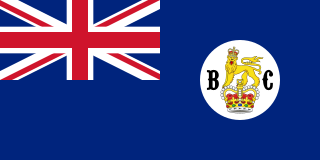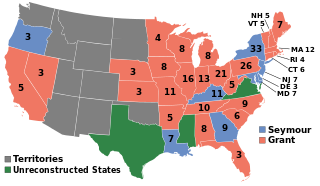Related Research Articles

The 1868 United States presidential election was the 21st quadrennial presidential election, held on Tuesday, November 3, 1868. In the first election of the Reconstruction Era, Republican nominee Ulysses S. Grant defeated Horatio Seymour of the Democratic Party. It was the first presidential election to take place after the conclusion of the American Civil War and the abolition of slavery. It was the first election in which African Americans could vote in the reconstructed Southern states, in accordance with the First Reconstruction Act.

Sir Hugh John Macdonald, was the only surviving son of the first prime minister of Canada, John A. Macdonald. He too was a politician, serving as a member of the House of Commons of Canada and a federal cabinet minister, and briefly as the eighth premier of Manitoba.

First Among Equals is a 1984 novel by British author Jeffrey Archer, which follows the careers and personal lives of four fictional British politicians from 1964 to 1991, with each vying to become Prime Minister. Several situations in the novel are drawn from Archer's own early political career in the British House of Commons, and the fictional characters interact with actual political figures from the UK and elsewhere including Winston Churchill, Alec Douglas-Home, Harold Wilson, Edward Heath, Margaret Thatcher, Douglas Hurd, Muammar al-Gaddafi, Gary Hart and Queen Elizabeth II.

Captain Hugh de Grey Seymour, 6th Marquess of Hertford, styled Earl of Yarmouth from 1870 to 1884, was a British soldier, courtier and Conservative politician. He notably served as Comptroller of the Household between 1879 and 1880.

Horatio Seymour was an American politician. He served as Governor of New York from 1853 to 1854 and from 1863 to 1864. He was the Democratic Party nominee for president in the 1868 presidential election, won by Republican and General Ulysses S. Grant.
The 1868 Democratic National Convention was held at Tammany Hall in New York City between July 4, and July 9, 1868. The slogan for the 1868 Democratic National Convention was, "This is a White Man's Country, Let White Men Rule". The convention was notable for the return of Democratic Party politicians from the southern states.

The Colony of British Columbia was a British Crown Colony that resulted from the amalgamation of the two former colonies, the Colony of Vancouver Island and the mainland Colony of British Columbia. The two former colonies were united in 1866, and the united colony existed until its incorporation into the Canadian Confederation in 1871.
Leslie George Seymour, JP was a British company director and politician from the city of Birmingham.
William Digby Seymour (1822–1895) was a British lawyer and poet, and MP for Sunderland and Somerset.

Vice-Admiral George Henry Seymour, was a Royal Navy officer who went on to be Third Naval Lord.
Mark Sykes of the Conservative Party narrowly won the by-election of 1911 in the constituency of Kingston upon Hull Central.
The 1869 Glasgow and Aberdeen Universities by-election was fought on 22 November 1869. The by-election was fought due to the resignation of the incumbent MP of the Liberal Party, James Moncreiff, to become a Lord Justice Clerk. It was won by the Conservative candidate Edward Strathearn Gordon.
The 1869 East Cheshire by-election was fought on 6 October 1869. The by-election was fought due to the death of the incumbent MP of the Conservative Party, Edward Christopher Egerton. It was won by the Conservative candidate William Cunliffe Brooks.
The 1869 Salisbury by-election was fought on 5 August 1869. The by-election was fought due to the resignation of the incumbent MP of the Liberal Party, Edward William Terreck Hamilton. It was won by the Liberal candidate Alfred Seymour.
The 1869 Stafford by-election was fought on 7 June 1869. The by-election was fought due to the Void election of the incumbent MP of the Conservative Party, Walter Meller. It was won by the Conservative candidate Thomas Salt.
The 1869 Brecon by-election was fought on 24 April 1869. The by-election was fought due to the Void election of the incumbent MP of the Conservative Party, Howel Gwyn. It was won by the Liberal candidate Edward Villiers.
The 1869 Dumfriesshire by-election was fought on 31 March 1869. The by-election was fought due to the disqualification of the incumbent MP of the Liberal Party, Sydney Waterlow, as he was deemed to be a government contractor. It was won by the Conservative candidate George Gustavus Walker.
The 1869 Westbury by-election was fought on 27 February 1869. The by-election was fought due to the void election of the incumbent MP of the Conservative Party, John Lewis Phipps. It was won by the Conservative candidate Charles Paul Phipps.
The 1869 South Derbyshire by-election was fought on 16 January 1869. The by-election was fought due to the death of the incumbent MP of the Conservative Party, Sir Thomas Gresley. It was won by the Conservative candidate Henry Wilmot.

The 1868 United States elections was held on November 3, electing the members of the 41st United States Congress. The election took place during the Reconstruction Era, and many Southerners were barred from voting. This was the first election after the ratification of the Fifteenth Amendment, which protected the voting rights of all citizens regardless of race or previous condition of slavery or involuntary servitude. After this election but before the next election, delegations from Texas, Virginia, Mississippi, and Georgia were readmitted to Congress.